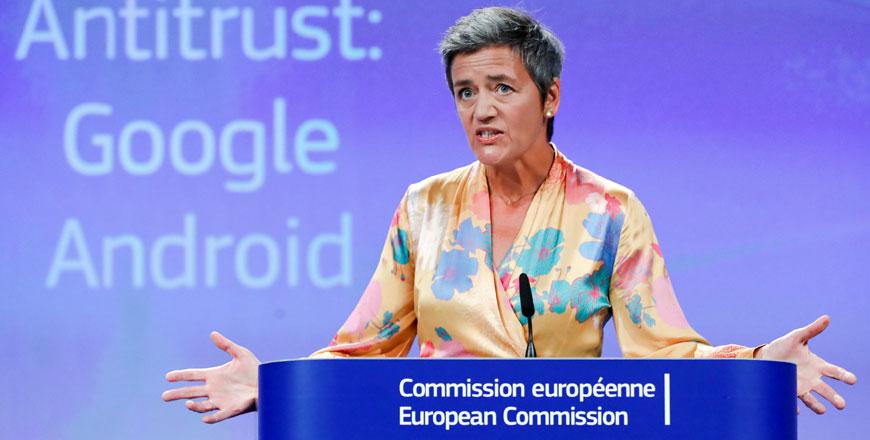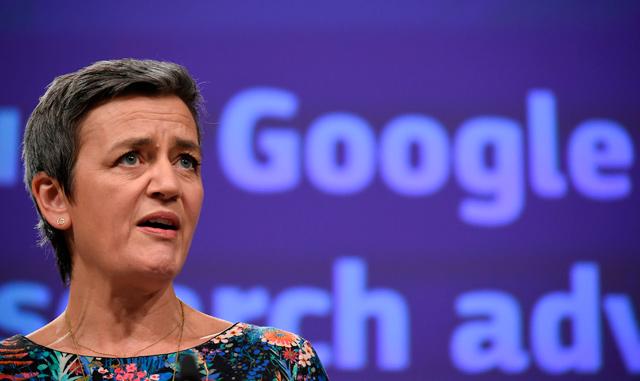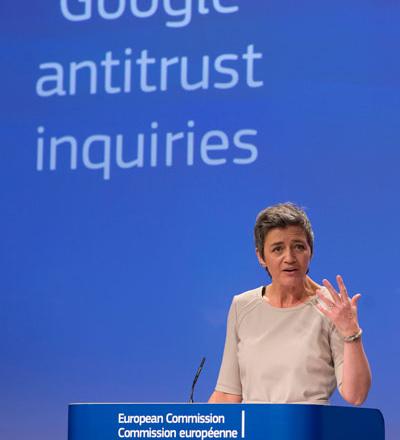You are here
Google hit with record $5 billion EU antitrust fine
By Reuters - Jul 18,2018 - Last updated at Jul 18,2018

European Competition Commissioner Margrethe Vestager addresses a news conference on Google in Brussels, Belgium, on Wednesday (Reuters photo)
BRUSSELS — EU regulators hit Google with a record 4.34 billion euros ($5 billion) antitrust fine on Wednesday for using its Android mobile operating system to squeeze out rivals.
The penalty is nearly double the previous record of 2.4 billion euros which the US tech company was ordered to pay last year over its online shopping search service.
It represents just over two weeks of revenue for Google parent Alphabet Inc. and would scarcely dent its cash reserves of $102.9 billion. But it could add to a brewing trade war between Brussels and Washington.
EU antitrust chief Margrethe Vestager denied anti-US bias, saying she very much liked the United States.
“But the fact is that this has nothing to do with how I feel. Nothing whatsoever. Just as enforcing competition law, we do it in the world, but we do not do it in political context,” she said.
Google said it would appeal the fine.
“Android has created more choice for everyone, not less. A vibrant ecosystem, rapid innovation and lower prices are classic hallmarks of robust competition,” it said.
Vestager’s boss, commission President Jean-Claude Juncker, is due to meet US President Donald Trump at the White House next Wednesday in an effort to avert threatened new tariffs on EU cars amid Trump’s complaints over the US trade deficit.
Vestager also ordered Google to halt anti-competitive practices in contractual deals with smartphone makers and telecoms providers within 90 days or face additional penalties of up to 5 per cent of parent Alphabet’s average daily worldwide turnover.
“Google has used Android as a vehicle to cement the dominance of its search engine. These practices have denied rivals the chance to innovate and compete on the merits. They have denied European consumers the benefits of effective competition in the important mobile sphere,” Vestager said.
The EU enforcer dismissed Google’s argument of competition from Apple, saying the iPhone maker was not a sufficient constraint because of its higher prices and switching costs for users.
Android, which runs about 80 per cent of the world’s smartphones according to market research firm Strategy Analytics, is the most important case out of a trio of antitrust cases against Google.
Some major Android device makers, including Samsung Electronics Co., Sony Corp., Lenovo Group Ltd. and TCL Corp., declined to comment on the EU case.
Regulatory action against tech giants like Google and Facebook with their entrenched market power may lack sting, said Polar Capital Fund Manager Ben Rogoff, who has been holding the stock since its initial public offering and is broadly neutral on Google.
“The reality is that as long as they’re delivering great utility to their consumers, consumers will still use those platforms. If they do, advertisers will be drawn to those platforms, too, because the ROIs [return on investment] are very difficult to replicate anywhere else,” he said.
The EU takedown of Google is six to eight years too late, with users paying the price, said Geoff Blaber of CCS Insight.
“Any action by the EU is akin to shutting the stable door after the horse has bolted,” he said.
“There is a significant danger of unintended consequences that penalises the consumer. This ranges from increased fragmentation and greater app inconsistency to increases in hardware cost should Google decide to change or adapt the Android business model.”
Lobbying group FairSearch, whose 2013 complaint triggered the EU investigation, welcomed the ruling, saying it could help restore competition in mobile operating systems and apps.
“This is an important step in disciplining Google’s abusive behaviour in relation to Android,” it said.
A third EU case, which has not yet concluded, involves Google’s AdSense product. Competition authorities have said Google prevented third parties using its product from displaying search advertisements from Google’s competitors.
Vestager has also ordered a series of measures against other US companies over tax practices in some EU states, notably demanding two years ago that the Irish government take back up to 13 billion euros from Apple Inc.
Related Articles
BRUSSELS — Alphabet unit Google was fined 1.49 billion euros ($1.7 billion) on Wednesday, its third large EU antitrust penalty in two years
The EU on Wednesday formally charged US Internet giant Google with abusing its search engine’s dominance and launched a sensitive probe into its omnipresent Android mobile phone operating system.
BRUSSELS — The European Union charged Google on Wednesday with using its dominant Android mobile operating system to squeeze out rivals, ope
















